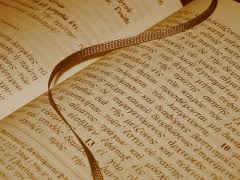"Let Us Draw Near" -- Hebrews 10:19-39
 Tuesday, February 25, 2014 at 10:34AM
Tuesday, February 25, 2014 at 10:34AM  The Fifteenth in a Series of Sermons on the Epistle to the Hebrews
The Fifteenth in a Series of Sermons on the Epistle to the Hebrews
There are some things easily taken for granted. A clean conscience before God based on the knowledge that Jesus Christ made a perfect, once for all sacrifice for sin which turns aside the wrath of God, is a priceless treasure. Yet, people will spend hundreds of dollars per hour to have a counselor or psychiatrist tell them that are OK, that they done nothing wrong, that they couldn’t help it, or that it is not their fault. It is easy to take for granted the fact that it is the priestly work of Jesus Christ which secures for us full access to the very presence of God, who graciously hears our prayers only because his beloved son intercedes for us. And it is very easy to take for granted that hope secured for us by Jesus Christ, who having completed his redemptive work on the cross and taken his place at God’s right hand, promises to come again to give us all those eternal blessings secured for us by his priestly work. All of these wonderful benefits are ours only because Jesus Christ is our great high priest who offered himself, once and for all, as the final and all sufficient sacrifice for sin. And it is this priestly work of Jesus Christ which secures for us the full assurance of our salvation and the freedom to draw near to God.
We are continuing our series on the Book of Hebrews and we will wrap up our time in chapters 9-10. Recall that these two chapters contain a sustained theological argument in which the author makes four important points about the priestly work and office of Jesus Christ. In Hebrews 9:1-10, the author explained the purpose and role of the tabernacle, priesthood, and temple, and demonstrated how these are but types and shadows which point ahead to the coming of Jesus. Then, in verses 11-28 of chapter 9, the author argued that our Lord’s shed blood does what the Old Testament sacrificial system could not do, take away the guilt of our sins and secure for us an eternal redemption. It is in this section of Hebrews that we find some of the most important explanations anywhere in the New Testament regarding our Lord’s priestly work on our behalf, and how the death of Jesus secures our salvation for us, because he has accomplished a perfect and eternal redemption on our behalf.
In our text last time (Hebrews 10:1-18), the author made plain that the death of Jesus has put an end to the validity of the old covenant sacrificial system. The shed blood of bulls and goats is now useless because the sacrifice to which these pointed has already been accomplished. Jesus made his once for all sacrifice for sin, and then sat down at the right hand of God. As we read in verse 14, “for by a single offering he has perfected for all time those who are being sanctified.” This declaration means that our standing before God has already been secured for us by the same Savior who has died for us.
In our text this time (vv. 19-39 of chapter 10), the author draws our attention to the practical consequences of Jesus Christ’s priestly work for us–the wonderful assurance which is now ours by virtue of trusting in what Jesus has already accomplished to save us from our sins. It is because of Jesus Christ’s finished work (on the cross and in the heavenly temple) that we have a pure conscience, as well as the confidence necessary to enter into the Lord’s presence to worship him, free to offer our sacrifices of praise and thanksgiving to our great high priest who has done so much to redeem us from our sins. In light of what Jesus has already done for us, the author closes out this section by exhorting us to take advantage of all the blessings and benefits secured for us by our great high priest. And once again, the author sternly warns us not to sow the seeds of apostasy by neglecting these benefits.
To read the rest of this sermon: Click Here


Reader Comments